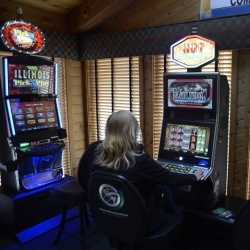The city council in Batavia, Illinois voted by a wide margin to lift a ban on video gambling in the city. Illinois cities have the authority under state law to allow video gambling machines. Batavia is larger than many of the communities which have rejected VLT gambling, as Batavia has 26,045 residents, according to the 2010 census.
The lifting of the ban means that Batavian businesses can install video gambling machines. Restaurants, bars, taverns, social clubs, and entertainment venues are likely to install a few of the machines, which are seen as a way to increase revenues for local Mom-and-Pop stores.
Batavia’s decision culminates the latest in a series of local debates on whether to allow gaming machines in local establishments in Illinois. Opponents of gaming machines say a ban should stay in place, because EGMs provide an easy means for problem gamblers to lose a lot of money. Many also take a moral stand against gambling in the community.
Proponents of gaming machines say a ban only hurts local businesses, because the gamblers go to establishments in nearby cities to get their entertainment.
Batavia’s Video Gambling Ban
Batavia and Geneva were the last two cities in Kane County to ban gaming machines. Both took a principled stand against the proliferation of gambling, but Batavia’s leaders saw their residents driving to other nearby towns to gamble. That had a domino effect, because it also meant residents bought gas or sought entertainment in the businesses of other towns, harming local business owners.
With the flow of revenue away from local businesses, the call went out to lift the ban in Batavia. Geneva banned electronic gaming machines in 2012, and now is the last holdout enforcing a ban.
8-3 Vote to Lift the Ban
The vote among the city council was 8-3 out of a 14-member council, with 3 abstentions. An alderman told the Kane County Chronicle that the vote happened because local business leaders asked for the ban to be lifted.
Under state law, each establishment is allowed up to 5 video gambling machines. The businesses with the EGMs must pay a yearly licensing fee of $25 per machine and 5% of revenues to the municipality. If twelves businesses install the maximum 5 machines apiece, the revenues generated for Batavia are expected to be $120,000.
Tax Revenues from Video Gambling Machines
That is in addiction to the 30% flat rate charged by the state on gaming revenues. Of that 30%, five-sixths is kept by the state and the remaining one-sixth is returned to the local community. Thus, the state of Chicago receives 25% of the total gaming revenue after payouts, while Batavia can expect an additional 5%.
The remaining 70% is shared between video terminal operators who place their machines in the establishments, as well as the establishments themselves. A large chunk of those revenues go to the VT operators, but the local establishments receive enough of a cash influx that it helps struggling businesses remain operative.
Jeff Schelke Preferred the Ban
Local media outlets did not provide information on which city council members voted to lift the ban. Mayor Jeff Schelke stated earlier this year that he would not vote to lift the ban, so it can be presumed that he is one of the 3 members who voted against the measure.
Since the state of Illinois voted in 2012 to allow video gambling machines, the machines have been a source of controversy. Many local businesses and their communities have welcomed the influx of cash, but some local leaders, religious groups, and problem gambling counselors have warned against the machines. Parents and parent groups have stated they do not like to see the machines ever-present in their communities.
Decatur Study on Video Gambling Machines
In June 2016, city leaders in Decatur, Illinois were searching for ways to set a limit on the number of venues which allowed such gaming machines. Decatur is listed by the Illinois Commission on Government Forecasting and Accountability, along with Rockford and Springfield, as the city’s with the most video gambling machines.
Decatur has commissioned a study to determine ways to limit video gambling machines in their community. That delays the need to make a decision. It’s a truism in politics that, if you do not want to take action, you commission a study to delay that action.
Those who support the study say that more information is needed. The longer gaming takes places and the more venues which have EGMs, the more data which can be collected. A decision must be made eventually, but politics is an ongoing debate between the beneficial and the harmless, or between the ideal and the practical. Illinois appears to support gambling machines in local establishments, so the only question is how many are a practical number that benefits local businesses, without causing too much harms to gamblers and the families of gamblers.

